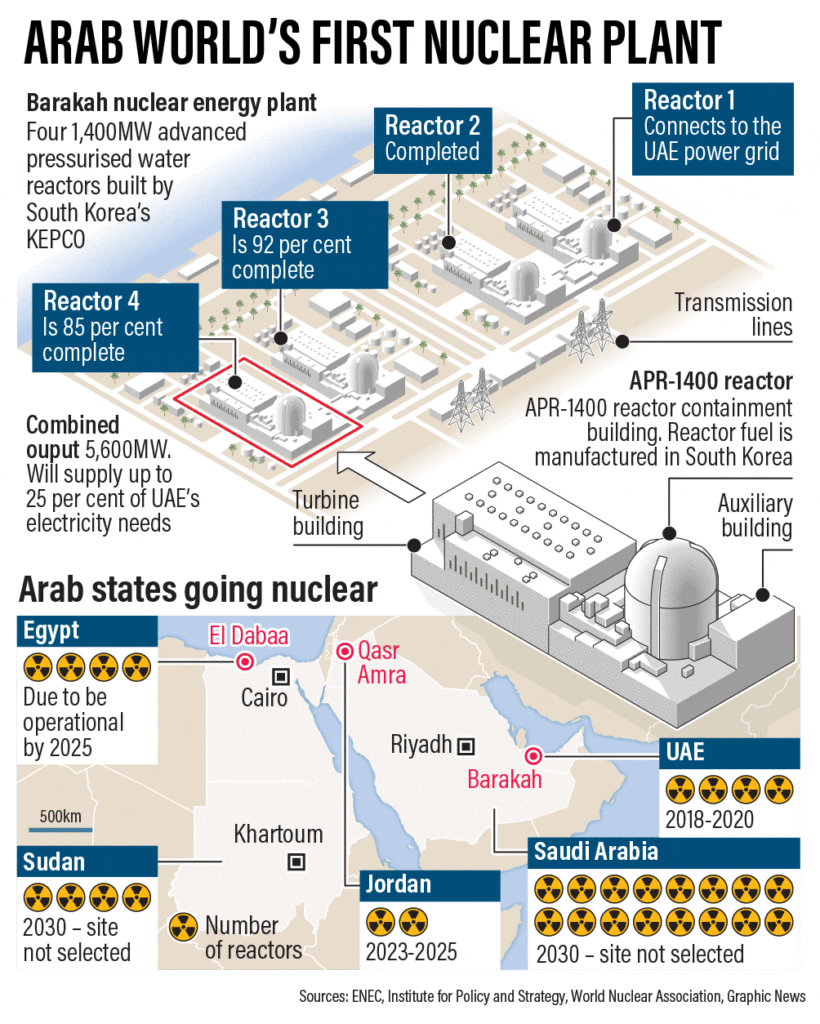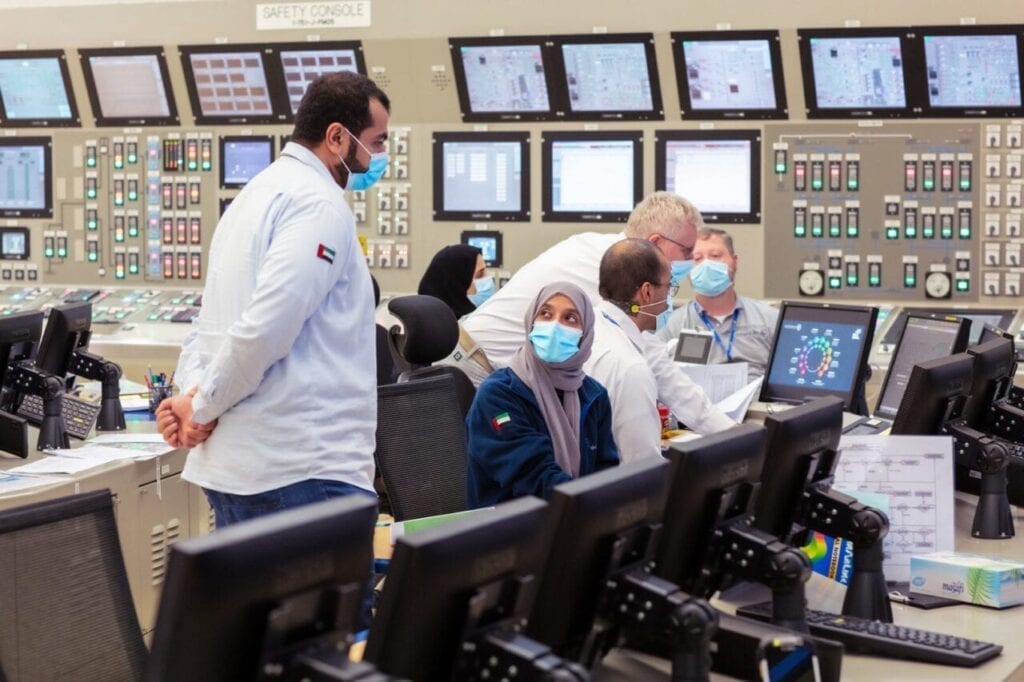Barakah Nuclear Plant Now Sending Power to Grid
Unit 1 of the Barakah Nuclear Energy Plant in the United Arab Emirates (UAE) sent its first electricity to the UAE grid on August 19, according to a statement from the country’s ambassador to the U.S.
The Barakah facility is the first nuclear power plant in the Arab world. The plant became operational about three weeks ago. Ambassador Yousef Al Otaiba, in a statement from his office in Washington, D.C., on Wednesday said, “Unit 1 of the United Arab Emirates’ Barakah Nuclear Energy Plant is now beginning to generate the first megawatts of clean electricity and powering the country’s homes, businesses, and industries. The successful synchronization of this unit to the UAE grid is already producing tangible environmental benefits. Once all four units of the power plant are fully operational, the Barakah plant will supply up to 25% of the UAE’s electricity without producing any carbon emissions. This milestone demonstrates the UAE’s commitment to generating clean, safe, and reliable baseload electricity.”
Wednesday’s milestone came after the generator in Unit 1 of the plant was integrated and synchronized as required with the UAE’s national electricity transmission grid. Since Unit 1 was turned on at the end of July, operations teams at Barakah have run a series of tests, steadily increasing power levels in order to produce the first megawatt of baseload electricity.
Four APR-1400 Reactors
The plant when fully operational with its four APR-1400 reactors is expected to deliver about 25% of the UAE’s electricity. The plant originally was expected to open in 2017, but startup has been repeatedly delayed due to various safety issues. Construction of Unit 1 was completed in 2018.
The UAE is the first Arab country to develop a nuclear power plant. It’s part of the UAE’s effort to decarbonize its energy sector, which includes rapid development of solar power. The effort to add nuclear power has been criticized by other countries in the Middle East, including Qatar, where officials last year said the Barakah plant is a “flagrant threat to regional peace and environment.”

The UAE today receives most of its electricity from natural gas-fired power plants, owing to the region’s abundance of natural gas.
“The UAE has built the first peaceful nuclear energy plant in the Arab world and this accomplishment is a testament to the country’s ongoing international cooperation and deep commitment to nuclear security,” Al Otaiba said in his statement. “An early milestone was achieved over 10 years ago with the signing of the U.S.-UAE 123 Agreement when both countries agreed to the strongest bilateral civil nuclear cooperation deal in nonproliferation history. The UAE’s voluntary commitment to forgo domestic enrichment and reprocessing of nuclear material was a significant development. The agreement serves as a model for the establishment of a peaceful and safe civilian nuclear energy program.”
“The connection of the first unit of the Barakah Nuclear Energy Plant to the UAE electricity grid is a momentous occasion for the Emirates Nuclear Energy Corporation [ENEC] and for partners of the UAE’s peaceful nuclear energy program,” Al Otaiba said. “Electricity output will be steadily raised over the coming months, with Emirati families and businesses benefiting from this clean source of electricity. This positive environmental impact will be felt throughout the region and for generations to come.”
Start of a ‘New Era’
Mohamed Ibrahim Al Hammadi, chief executive of ENEC, said Wednesday’s action of sending power to the grid is the start of a new era for the country. “The safe and successful connection of Unit 1 to the UAE grid marks the key moment when we begin to deliver on our mission to power the growth of the nation by supplying clean electricity, around the clock,” he said. “Grid connection of Unit 1 really is the beginning of a new era in our project, which is built upon years of preparation and adherence to the highest international safety and quality standards. We are confident in our people and our technology to continue to progress to reach commercial operations, and the completion of the remaining three units.”

Al Hammadi noted the nuclear plant’s initial lifecycle is 60 years, and is part of the country’s move to cleaner sources of power generation. “This project, in addition to the UAE’s efforts made in implementing other forms of clean power generation, delivers one of the most ambitious clean electricity transformations in the region and the world, setting the nation on a new track of sustainable development and electrification,” he said.
The operators of Unit 1 will continue to increase the reactor’s power levels as part of the “power ascension” process, to ensure the unit is safely brought to full capacity. The power ramp-up will be monitored by the UAE’s independent nuclear regulator, the Federal Authority for Nuclear Regulation (FANR), which has now conducted more than 280 inspections at the plant since the start of Barakah’s development.
“Since issuing the operating license in February for Unit 1 of Barakah nuclear power plant, FANR has continued its regulatory oversight: starting with fuel loading, testing, including the first criticality phase until connecting the unit to the UAE national electricity transmission grid to produce electricity,” the authority said in a statement.
The International Atomic Energy Agency, and the World Association of Nuclear Operators, also have carried out more than 40 inspections and assessments of the plant.
Praise for Local Workers
Al Hammadi, as he has done previously, praised the local workforce that has led the plant’s construction.
“I am especially proud of the talented UAE National engineers and nuclear professionals who contributed to the construction and commissioning of Unit 1, as well as the UAE national reactor operators and senior reactor operators who have trained for many years across the world and today have the nuclear intellect and know-how to safely manage the plant, to reach the key milestone to power the growth of the UAE with safe, clean and reliable electricity to the UAE grid, working alongside our international experts,” he said.
—Darrell Proctor is associate editor for POWER (@DarrellProctor1, @POWERmagazine).